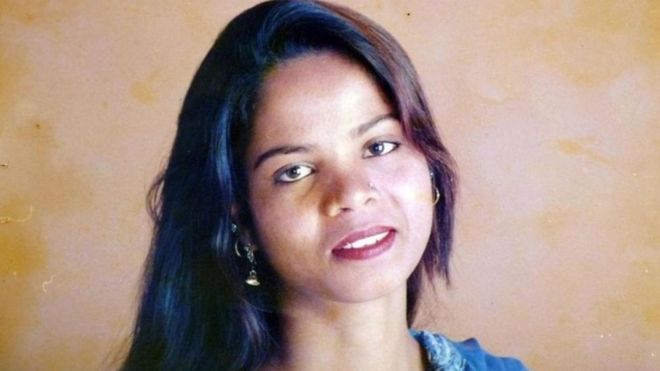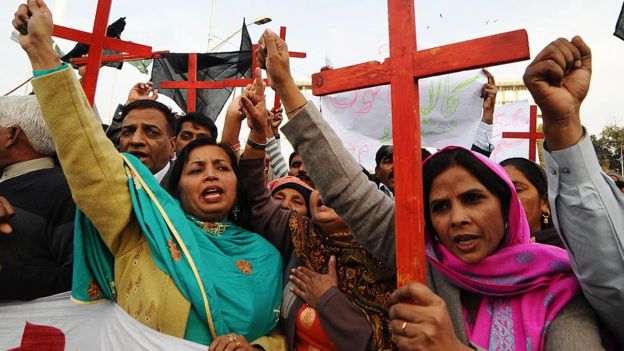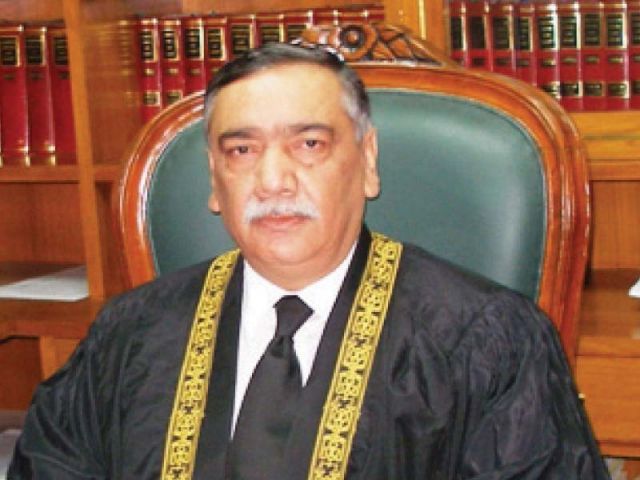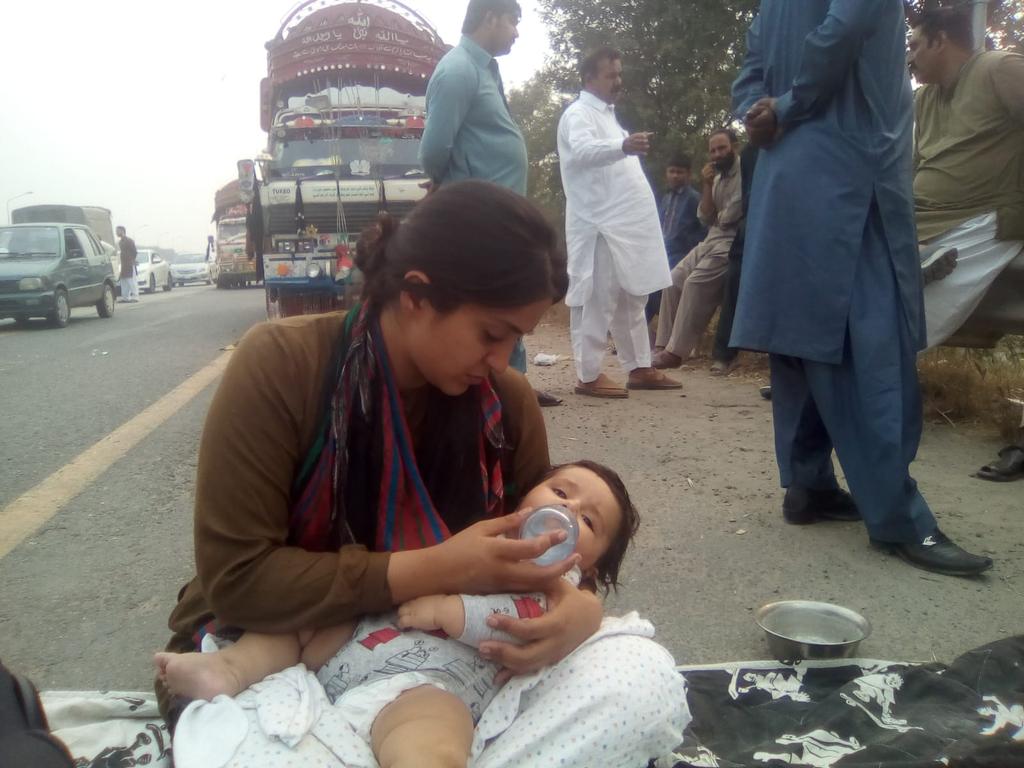KARACHI: The Supreme Court of Pakistan ordered the acquittal and immediate release of Aasia Bibi, a Christian woman who had been accused of blasphemy, in its final verdict of the long-delayed case.
Aasia Bibi was accused and charged with blasphemy in 2010 by a prayer leader in Nankana Sahib. She was accused of having made blasphemous comments following a quarrel with two women in a field where they worked as farm labourers.
A three-member bench, headed by Chief Justice Mian Saqib Nisar and comprising Justice Asif Saeed Khosa and Justice Mazhar Alam Khan Miankhel, announced the verdict Wednesday morning.
In its 56-page long verdict, the apex court maintained that there were various contradictions in the witnesses accounts presented in the court against Aasia.
Read: Aasia Bibi’s case, explained
Here are some highlights from the verdict of the landmark case:
1. Mashal Khan and the misuse of the blasphemy law
The first 10 pages of the verdict quote verses from the Holy Quran, as well as Ahadith and even a verse from Iqbal’s Jawaab-e-Shikwa to stress the fact that “utmost respect” and “unconditional obedience to follow” the Holy Prophet (pbuh) are the foundations upon which Islam is based, and opponents of God and the Holy Prophet (pbuh) must face punishments.
It goes into detail about the history of the blasphemy law, its inclusion in the Pakistan Penal Code and so on.
It then goes on to state that while it is clear that no one should be allowed to defy the name of the Holy Prophet (pbuh) and go unpunished; however, there are times the law is misused.
“To fulfill nefarious designs the law is misused by individuals leveling false allegations of blasphemy. Stately, since 1990, 62 people have been murdered as a result of blasphemy allegations, even before their trial could be conducted in accordance with law,” the verdict states.
It goes on to give the example of Mashal Khan, a student of Abdul Wali Khan University, Mardan, who was lynched by an enraged mob in 2017 “merely due to an allegation that he posted blasphemous content online.” Khan was declared falsely accused by a court.
The order also mentioned one Ayub Masih who was falsely accused of blasphemy, following which a mob burnt down houses of christians and drove them out of their village. The allegations were made over a land dispute.
Read: Salmaan Taseer in numbers
2. Inconsistencies in witness accounts
Firstly, the order mentions that the FIR against Aasia was lodged about five days after the alleged incident of blasphemy took place which cast doubts on its veracity. According to the accuser Qari Muhammad Salman, who filed the FIR, Asia Bibi confessed to committing blasphemy in an apparent public meeting after which the case was registered.
Further, although 25-30 women are said to have been present during the alleged quarrel on the field, only two came forward with a complaint. The verdict states:
“It is pertinent to mention here that admittedly, as is evident from the contents of the FIR and also the statements of the witnesses, there were 25-30 ladies present at the spot when the appellant allegedly passed blasphemous remarks against the Prophet Muhammad (صلى الله عليه وسلم ,(however, none of the other ladies except Mafia Bibi (PW.2) and Asma Bibi (PW.3) reported the matter to anyone.”
And even their accounts were contradictory. The complainant and witnesses Mafia Bibi and Asma Bibi kept changing their accounts about the alleged public gathering where Asia was said to have confessed to committing blasphemy.
The court stated that the inconsistent statements of the witnesses are tantamount to cast further doubts on the coherence of the evidence pertaining to the following questions:
a) Who informed the complainant about the occurrence of such?
b) Who was present at the time of disclosure regarding the allegation made against the appellant?
c) How many people were present at the time of the public gathering?
d) Where did the public gathering took place?
e) What was the distance between the place of the public gathering and the house of the appellant?
f) How and who brought the appellant to the public gathering
3. Aasia Bibi’s account
The apex court observed that the charges came up after there was a feud in the farming field where the accused used to work when her Muslims coworkers refused to share a glass of water with her because of her faith.
Here is Aasia’s account in which denies she ever committed blasphemy or confessed to committing it:
“I am a married woman having two daughters. My husband is a poor labourer. I used to pluck Falsa from the fields of Muhammad Idrees along with a number of other ladies on the basis of daily wages. On the alleged day of occurrence, I along with number of ladies were working in the fields. Both the ladies Mst. Mafia Bibi and Mst. Asma Bibi PWs quarreled with me over fetching water which was offered by me to bring for them, but they refused saying that since I am Christian, they will never take water from my hand. Over this the quarrel ensued and some hot words were exchanged between me and the PWs ladies. The PWs then approached Qari Saalam complainant through his wife who remained teaching the both ladies, hence, the PWs were conspiring with Qari Saalam got a false, fabricated and fictitious case against me. I offered my oath to police on Bible that I had never passed such derogatory and shameful remarks against the Holy Prophet (PBUH) and the Holy Quran. I have great respect and honour to the Holy Prophet (PBUH) as well as Holy Quran and since police had conspired with the complainant, so, the police have falsely booked me in this case. The PWs are real sisters and interested to unfaithfully involve me in this case as they both felt disgrace and dishonour on the basis of altercation and hard words extended to them. Qari Saalam, the complainant is also an interested person and both the ladies remained teaching Holy Quran from his wife. My forefathers are living in this village since the creation of Pakistan. I am also about 40 years old and since the alleged occurrence, no complaint of such nature has ever accrued. I am a Christian and I live in the village, so, being ignorant of any Islamic thought, how can I use such clumsy and derogatory remarks against the beloved Prophet (PBUH) of Allah and the Divine book viz. Holy Quran. (PW) Idrees is also an interested witness who has close family links with their above said ladies.”
4. Aasia Bibi given benefit of doubt
Justice Khosa in his concluding remarks stated that benefit of doubt is extended to Aasia Bibi.
“All these contradictions are sufficient to cast a shadow of doubt on the prosecution’s version of facts, which itself entitles the appellant to the right of benefit of the doubt. It is a well settled principle of law that for the accused to be afforded this right of the benefit of the doubt, it is not necessary that there should be many circumstances creating uncertainty,” the verdict maintained.
The chief justice also observed that “it is a well settled principle of law that one who makes an assertion has to prove it. Thus, the onus rests on the prosecution to prove guilt of the accused beyond reasonable doubt throughout the trial.”
“Keeping in mind the evidence produced by the prosecution against the alleged blasphemy committed by the appellant, the prosecution has categorically failed to prove its case beyond reasonable doubt.”
He concluded his remarks with an Ahadith:
“Beware! Whoever is cruel and hard on a non-Muslim minority, or curtails their rights, or burdens them with more than they can bear, or takes anything from them against their free will; I (Prophet Muhammad) will complain against the person on the Day of Judgment.” (Abu Dawud)
5. Accusers ‘no less blasphemous’
Perhaps the most important part of the verdict is when the court calls out the accusers of the committing the same offence that they alleged. It came to light during hearings that complainants during the feud in the field had said blasphemous words against Aasia Bibi’s religion.
“The statements made by Muhammad Idrees (CW1) and Muhammad Amin Bukhari, SP (Investigation) (PW6) before the trial court revealed that the alleged blasphemy had been committed by the Christian appellant after her Muslim co-workers had insulted the appellant’s religion and had injured her religious sensibilities only because she believed in and was a follower of Jesus Christ. According to the Holy Qur’an a Muslim’s faith is not complete till he believes in all the Holy Prophets and Messengers of Almighty Allah including Jesus Christ (Isa son of Maryam) (Peace Be Upon Him) and all the revealed Holy Books of Almighty Allah including the Holy Bible. From that perspective insulting the appellant’s religion by her Muslim co-workers was no less blasphemous,” it read.
The court emphasised that insulting the defendant’s religion was no less blasphemous.

 Asia Bibi who was acquitted in blasphemy case by the Supreme Court.
Asia Bibi who was acquitted in blasphemy case by the Supreme Court.











